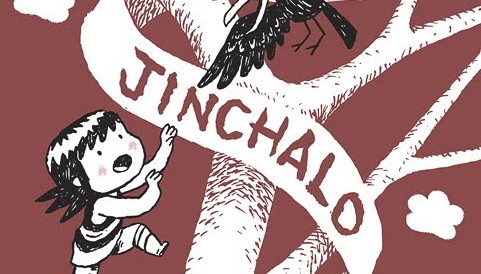Jinchalo, title of Matthew Forsythe’s newest graphic novel, is a Korean expression, meaning “really?” A question of reality: what and where is the line between what is real and what is imagined?
A companion piece to Forsythe’s critically acclaimed book Ojingogo, Jinchalo follows the story of Voguchi, a young girl set upon an adventure away from her home. The book plays with many stories and themes from Korean mythology but for many North American readers the story will somewhat resemble an Alice in Wonderland narrative.
Another distinction of Jinchalo, a similarity with Ojingogo, is that it is essentially a wordless comic. Aside from a single instance of obligatory dialogue there are no words spoken in this book, only expressions, actions, reactions. It’s an element that requires the reader to approach the book differently — the images, not the text, are the primary tool by which the narrative is communicated.
The pages of Jinchalo read more as an emotional experience than a cognitive one. Without any words, readers must interpret much more than usual — it’s something the book encourages with a certain level of playfulness and wit. Many pages will evoke a laugh, at least a chuckle, even though contextually the image is somewhat bewildering. At times, Jinchalo revels in the absurd.
The imagery in Forsythe’s book manages to be at the same time comedic and beautiful. The colouring especially seem pay homage to a certain look often associated with Asian mythology and storytelling. There are no panels in Jinchalo, the pictures blend into the blank page in a way that allows for a minimalist aesthetic, very much in line with the soft, mute nature of the book.
Although Jinchalo is without doubt a quality product by a talented artist, one area where it falters is the intended audience. It is not immediately apparent whom this book is for (this is a similar issue for Ojingogo). It could be read to children, but the onus is always on the reader to interpret exactly what the pictures mean, the significance and ultimately the meaning of the journey.
The most logical audience for Jinchalo is the graphic novel enthusiast, which is a shame because, although it will be appreciated, there are elements of this book that pit it against the odds in terms of reaching a wider audience. The destination is worth the journey but Jinchalo has a demanding point of entry, one that is sure to turn some away.
Released on Feb. 29, Jinchalo is distributed through the Montreal-based Drawn and Quarterly. It is Forsythe’s fourth graphic novel.


